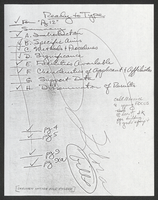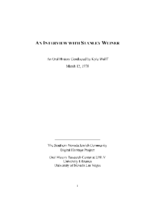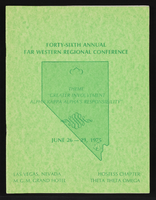Search the Special Collections and Archives Portal
Search Results

Transcript of interview with Patricia Ross by Judy Harrell, March 19, 2014
Date
Archival Collection
Description
Patty Ann Drew’s life experiences capture large movements in Las Vegas history: mob-dominated gambling, the Helldorado Rodeo, explosive growth, medical advances, and Clark County School District’s Sixth Grade Centers—all in a desert city centered in the Mormon Culture Region. Patty arrived in Las Vegas as an infant with her parents and older brothers in 1944 and was raised in the Huntridge area, where she and her brothers attended John S. Park Elementary School and matriculated from there to Las Vegas High School. In this interview, Patty talks about her parents working on the Strip, her school days, joining the Church of Jesus Christ of Latter-day Saints, marrying her high school sweetheart, and becoming a young mother in Las Vegas. After Patty married her second husband, Thomas Ross, the couple built a house west of Jones Boulevard and Patty gave birth to her third son. In addition, she returned to school to earn her Bachelor’s and Master’s degrees and taught at C. H. Decker Elementary School for twenty years.
Text

University of Nevada, Las Vegas law school establishment: correspondence
Date
Archival Collection
Description
Folder from the Flora Dungan Papers (MS-00193) -- Series 4. University of Nevada Regents Material.
Text

Transcript of interview with Priscilla Scalley by Claytee White, July 24, 2014
Date
Archival Collection
Description
Priscilla and Joe Scalley arrived in Las Vegas in 1972 with their two young daughters. Joe had just completed his residency in radiology and came to Las Vegas to practice at Sunrise Hospital, where he eventually became Southern Nevada’s first neuroradiologist. The couple took out two mortgages to buy their house at 2900 Justice Lane, in the Rancho Nevada Estates section of Ward 1. They were the second owners of the house, which had been built in 1967. In 1993, after their daughters had graduated from high school, the Scalleys sold the house and moved to Summerlin. Joe Scalley died in October 1994. After Joe died Priscilla became reacquainted with and married the father of one of her daughters’ childhood friends, Joel Jobst, who was also widowed. Joel was a nuclear physicist retired from the Nevada Test Site. Priscilla and Joel bought a vacation home in Montana, where they spent every summer. They celebrated 13 years of marriage before Joel passed in 2013. As a young mother Priscilla joined the West Charleston Elementary School Parent Teacher Association and eventually became president. She helped found the Friends of the Libraries when the Clark County Library District had only two libraries—Flamingo Library and West Charleston Library—and served as that group’s president. She also was active in Junior League of Las Vegas and was president 1983?84. In her early forties Priscilla became a travel agent, a career that kindled a passion for travel that still burns brightly. She also is interested in genealogy. Although she has traveled the world she yearns to take her daughters, sons in law, and grandchildren to Ireland, the land of her ancestors.
Text

Transcript of interview with Edward "Ed" Butera by Stefani Evans and Claytee White, July 28, 2016
Date
Archival Collection
Description
Engineer Edward "Ed" Butera spent hours constructing models from the time he was a five-year-old boy in San Jose, California. Besides his interest in building and design, the young Butera also loved math and music—specifically the clarinet, at which he excelled, and which he still enjoys. After earning his Bachelor’s degree in Electrical Engineering at San Jose State University he was hired by Ralph Joeckel as a consulting engineer for Trane, a heating and air conditioning company. Joeckel became a mentor and "second dad" to Butera after the company sent him to Las Vegas in 1972, and the two remain close to this day. In this interview, Butera shares how he engineered and designed power, water, sanitation, utilities, and heating and cooling systems on many Clark County high schools, hospitals, and data centers while considering such factors as the building's shape and its affect on the way wind forces act on its glass, windows, and doors. He talks of his casino work that began with the Stardust soon after he arrived in Las Vegas, and before his client list grew to include Tony Marnell, Steve Wynn, and MGM. Besides the hotels, he shares his experiences engineering the infrastructure for the Bellagio fountains, The Mirage volcano, Treasure Island's pirate show.
Text

Transcript of interviews with Louis Wiener, Jr. by Eleanor Johnson, January-February, 1990
Date
Archival Collection
Description
In this multi-part interview, Louis Wiener, Jr. discusses coming to Las Vegas from Pittsburgh at a young age, attending Las Vegas High School and University of Nevada Reno. He attended law school at University of California at Berkeley and passed the Nevada State Bar in 1941. He established a practice, Jones, Wiener and Jones, with Bob Jones and Cliff Jones and later with Herb Jones. He had another practice with Neil Galatz and Dave Goldwater, retiring in 1988. Wiener had other business ventures that allowed him to do pro bono work as a lawyer. Wiener discusses his family, including former spouses, his children, and various aspects of his career as an attorney in Las Vegas, representing hotels in the Greenspun antitrust lawsuit, and as an attorney for Bugsy Siegel. He says of his success, "I'm just lucky. I was here at the right time and I picked the right people to help."
Text

Transcript of interview with Stanley Weiner by Kyle Wolff, March 12, 1978
Date
Archival Collection
Description
Interview with Stanley Weiner by Kyle Wolff on March 12, 1978. In this interview, Weiner begins by talking about his father's employment, and then his own series of jobs, including as a department manager at Sears. He discusses living in different parts of town, population growth, educational opportunities, transportation, and recreation. The interviewer asks specific questions about sports, hotels, unions, and the weather.
Text

Transcript of interview with Billy Paul Smith by Claytee White, October 3, 2013
Date
Archival Collection
Description
Chemist, mathematician, and health physicist Billy Paul Smith donates time to tutor young people in hopes of attracting more youth into the fields of math and science. Born in 1942 and schooled in segregated black schools in Shreveport, Louisiana, and Texarkana, Texas, he graduated from high school at age fifteen and enrolled at Prairie View A&M University, where he trained with the Reserve Officer Training Corps (ROTC) and earned his Bachelor’s degree in chemistry and in 1964 his Master’s degrees in chemistry and math. Most young U.S. Army officers in 1964 went to Vietnam, but Billy’s math and science background steered him to the Army Chemical Corps, where he was quickly selected to join a new team. The team was to develop responses to nuclear weapon accidents and worked under the Defense Atomic Support Agency (DASA) in Albuquerque, New Mexico. At the same time, Billy completed the Weapons Ordinance Army course on classified information relating to the U.S. nuclear weapons arsenal. In this interview, Billy talks about his service with DASA and his subsequent twenty-seven years working at the Nevada Test Site in a variety of positions with Reynolds Electrical and Engineering Company, Inc. (REECo), a company that had “percentagewise more blacks in management positions than any other [Las Vegas] company.” He experienced the quiet racism of Las Vegas residential segregation when he tried to purchase a house in a neighborhood he liked and the unexpected kindness of the REECo general manager, Ron Keen, who made sure the Smith family could live where they wanted to live. He talks about Area 51 and explains underground testing activity and offers the scientific and ecological reasons why scientists deemed Yucca Mountain safe to store nuclear waste. After retiring at fifty-two, Billy and a colleague formed an independent instrumentation company, which, from 1995–2005 provided and calibrated radiological measurement and detection instruments for the decommissioning and closure of the Rocky Flats nuclear plant in Golden, Colorado. During that time, Billy rented an apartment in Boulder, but he and Jackie maintained their Las Vegas home, where they still reside. Billy shares memories of places he and his wife used to enjoy on the Westside and tells of their longtime friends in the black community. He also talks about developing his philosophy of philanthropy through Alpha Phi Alpha Fraternity and discusses becoming a member of the Knowledge Fund Advisory Council for the Governor’s Office of Economic Development (GOED) and the advisory council for the Nevada System of Higher Education.
Text

Alpha Kappa Alpha Sorority 46th Far West Regional conference program (M.G.M. Grand)
Date
Archival Collection
Description
From the Alpha Kappa Alpha Sorority, Incorporated, Theta Theta Omega Chapter Records (MS-01014) -- Ivy Leaf magazines and event souvenir programs file.
Text

Transcript of interview with Jarmilla McMillan-Arnold by Claytee D. White, October 7, 2010
Date
Archival Collection
Description
Jarmilla McMillan-Arnold’s father, Dr. James B. McMillan, was the first black dentist in the state of Nevada. Dr. McMillan’s colleagues consisted of Dr. West, the first black medical doctor in the state, and Dr. Ice, the first black surgeon in Nevada. This interview highlights and archives the solid foundation upon which Nevada’s black community was built. Jarmilla recalls early memories of growing up as the daughter of Las Vegas NAACP president Dr. McMillan. She was born in Detroit, Michigan, to a Caucasian and Indian mother who was a professional dancer. Jarmilla’s parents separated when she was very young and as a result she was raised by her paternal grandmother who owned a restaurant in Pontiac, Michigan. Jarmilla describes her grandmother as being well-known and highly regarded in the community where she maintained her business. Jarmilla attended Catholic schools in Detroit, Pontiac, and Las Vegas. Having moved to Las Vegas with her father, Jarmilla’s narrative offers keen insigh
Text

Transcript of interview with Louis F. La Porta by Stefani Evans and Claytee White, November 4, 2016
Date
Archival Collection
Description
Louis La Porta served on the City Council of Henderson, Nevada and the Board of Clark County, Nevada and oversaw periods of great growth. He was born in 1924 in New York City, but his service in the United States Air Force pulled him out West. After settling in Henderson, Nevada, with his wife Elayne, La Porta became interested in insurance sales and local politics. While in office, La Porta oversaw the development of critical roads for Clark County, the Henderson Historical Society, and Henderson Libraries. He recounts each of these major developments in his interview, chronicling the evolution of Henderson, Nevada, into a major city.
Text
